
Using ExpressJS with MongoDB: Building a Backend for Your App
In the ever-evolving landscape of web development, creating a robust backend is essential for powering modern applications. ExpressJS, a powerful Node.js framework, combined with MongoDB, a flexible NoSQL database, offers a potent combination for building feature-rich and scalable backend solutions. In this blog, we'll delve into the seamless integration of ExpressJS with MongoDB, exploring how to architect a dynamic backend that handles data storage, retrieval, and manipulation. Whether you're building a web app, an API, or a dynamic platform, understanding the synergy between ExpressJS and MongoDB is a key step towards delivering a comprehensive and efficient solution. Additionally, we'll introduce you to our Hire ExpressJS Developer Services, which can help you create a tailored backend for your application.
![[object Object]](https://clipl-web1.sgp1.cdn.digitaloceanspaces.com/images/clu85gka7004r4irzd91c371v.png )
The ExpressJS-MongoDB Synergy: ExpressJS and MongoDB together provide a flexible and versatile platform for backend development, enabling you to create applications with the following advantages:
- Rapid development: ExpressJS's simplicity and MongoDB's schema-less nature expedite the development process.
- Scalability: MongoDB's horizontal scaling and ExpressJS's modular architecture cater to growing user bases.
- Real-time capabilities: Create real-time applications with ExpressJS and MongoDB's support for dynamic data updates.
![[object Object]](https://clipl-web1.sgp1.cdn.digitaloceanspaces.com/images/clu85nlcz005f4irzfz3e0wr7.png )
- Setting Up Your Project: Initialize your ExpressJS project and connect to your MongoDB database using a driver like `mongoose`.
- Defining Schemas and Models: Create schemas and models to define the structure of your data in MongoDB. These act as blueprints for your documents.
- CRUD Operations: Implement Create, Read, Update, and Delete (CRUD) operations using ExpressJS routes and controllers. Utilize `mongoose` to interact with your MongoDB database.
- Middleware Integration: Incorporate middleware to handle validation, authentication, and authorization before processing CRUD operations.
- Error Handling: Implement error handling mechanisms to gracefully manage database-related errors and exceptions.
- Data Relationships and References: Establish relationships between data entities using references or embedding, depending on your application's requirements.
![[object Object]](https://clipl-web1.sgp1.cdn.digitaloceanspaces.com/images/clu85m59u00594irzbiewgpyn.png )
Hire ExpressJS Developer Services: While integrating ExpressJS with MongoDB offers a powerful backend solution, navigating their intricacies requires expertise. Our Hire ExpressJS Developer Services offer valuable support:
- Collaborate with skilled ExpressJS developers experienced in architecting backend solutions with MongoDB integration.
- Expedite your project's development by leveraging our knowledge and best practices.
- Ensure seamless integration of ExpressJS and MongoDB components, enhancing your application's performance and scalability.
- Access ongoing support and maintenance to keep your backend up-to-date and efficient.
Conclusion: Creating a dynamic and efficient backend is essential for delivering exceptional user experiences in modern applications. By harnessing the capabilities of ExpressJS and MongoDB, you can build a robust backend that handles data storage, retrieval, and manipulation with ease. As you embark on this backend development journey, consider CloudActive Labs as your partner. Our Hire ExpressJS Developer Services provide the expertise needed to elevate your ExpressJS and MongoDB integration, ensuring your applications are built with precision, scalability, and optimal performance in mind. Reach out to CloudActive Labs today and unlock the full potential of your backend development with ExpressJS and MongoDB.
























